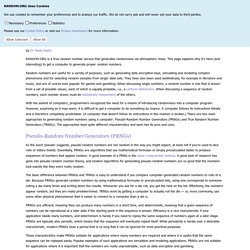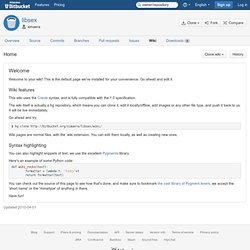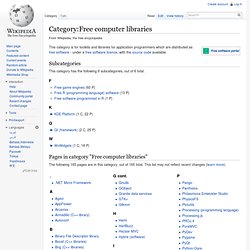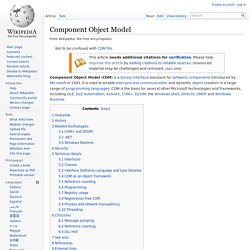

List of Twitter Bootstrap Resources and plugins. Javascript / Graphics. Javascript Libraries.
Introduction to Randomness and Random Numbers. <p style="background-color:#ffff90;padding: 0em .5em 0em .5em;font-size:.9em"><strong>Warning:</strong> Your browser does not support JavaScript – RANDOM.ORG may not work as expected</p> RANDOM.ORG Uses Cookies We use cookies to remember your preferences and to analyze our traffic.

We do not carry ads and will never sell your data to third parties. Please see our Cookie Policy or visit our Privacy Dashboard for more information. by Dr Mads Haahr RANDOM.ORG is a true random number service that generates randomness via atmospheric noise. Random numbers are useful for a variety of purposes, such as generating data encryption keys, simulating and modeling complex phenomena and for selecting random samples from larger data sets. With the advent of computers, programmers recognized the need for a means of introducing randomness into a computer program. Pseudo-Random Number Generators (PRNGs) True Random Number Generators (TRNGs) Thunderstorms generate atmospheric noise Suggested Reading.
Ximaera / libsex. Welcome to your wiki!

This is the default page we've installed for your convenience. Go ahead and edit it. Wiki features This wiki uses the Creole syntax, and is fully compatible with the 1.0 specification. The wiki itself is actually a hg repository, which means you can clone it, edit it locally/offline, add images or any other file type, and push it back to us. Go ahead and try: $ hg clone Wiki pages are normal files, with the .wiki extension. Syntax highlighting You can also highlight snippets of text, we use the excellent Pygments library.
Here's an example of some Python code: def wiki_rocks(text): formatter = lambda t: "funky"+t return formatter(text)
IP location. Hashing. FreeVBCode - High Quality Visual Basic and C# Source Code. Category:Free computer libraries. This category is for toolkits and libraries for application programmers which are distributed as free software - under a free software licence, with the source code available.

Subcategories This category has the following 6 subcategories, out of 6 total. Pages in category "Free computer libraries" The following 165 pages are in this category, out of 165 total. This list may not reflect recent changes (learn more). Computers: Programming: Libraries.
Perl. Game Builder. Component Object Model. Overview[edit] Unlike C++, COM provides a stable ABI that does not change between compiler releases.[3] This makes COM interfaces attractive for object-oriented C++ libraries that are to be used by clients compiled using different compiler versions.

History[edit] One of the first methods of interprocess communication in Windows was Dynamic Data Exchange (DDE), first introduced in 1987, that allowed sending and receiving messages in so-called "conversations" between applications. Object Linking and Embedding (OLE), Microsoft's first object-based framework, was built on top of DDE and designed specifically for compound documents. It was introduced with Word for Windows and Excel in 1991, and was later included with Windows, starting with version 3.1 in 1992. An example of a compound document is a spreadsheet embedded in a Word for Windows document: as changes are made to the spreadsheet within Excel, they appear automatically inside the Word document.
Related technologies[edit] GUASI Home Page.
Regular Expressions. A Fast CSV Reader. Introduction One would imagine that parsing CSV files is a straightforward and boring task. I was thinking that too, until I had to parse several CSV files of a couple GB each. After trying to use the OLEDB JET driver and various Regular Expressions, I still ran into serious performance problems. At this point, I decided I would try the custom class option. I scoured the net for existing code, but finding a correct, fast, and efficient CSV parser and reader is not so simple, whatever platform/language you fancy. I say correct in the sense that many implementations merely use some splitting method like String.Split(). And, this led to the CSV reader class I present in this article. Benchmarking it against both OLEDB and regex methods, it performs about 15 times faster, and yet its memory usage is very low.
To give more down-to-earth numbers, with a 45 MB CSV file containing 145 fields and 50,000 records, the reader was processing about 30 MB/sec. Read about the latest updates here History.